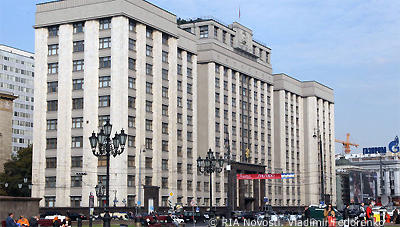Russian Duma Amends One Antisanctions Bill, Postpones Vote On Another

(Article ©2018 RFE/RL, Inc., Radio Free Europe/Radio Liberty – rferl.org – May 17, 2018 – also appeared at rferl.org/a/russia-duma-amends-one-antisanctions-bill-postpones-vote-on-another/29232439.html)
The lower chamber of the Russian parliament, the State Duma, has amended and approved in its second reading a bill that provides for countermeasures against the United States and other countries that imposed sanctions against Russia.
A third and final reading is scheduled for May 22 before the bill that would give the Russian government authority to ban trade in certain items with countries deemed to be unfriendly to Moscow goes to President Vladimir Putin to be signed into law.
The bill had initially said that supplies of medications, alcohol and tobacco, agricultural and industrial products, technological equipment, and software from the United States and other countries that “implement unfriendly moves toward Russia” would be banned.
After a number of experts criticized the bill, saying that it might lead to problems in Russia’s pharmaceutical sector and in other areas of its economy, lawmakers excluded from the text the specific names of goods, food, services, and sectors of the economy.
Now, under the bill, the decision about what products or services are affected by the restrictions will be made by the government. The retaliatory measures will be carried out by the government following a “decision” by Putin.
The countersanctions can be lifted by the government if Putin instructs such a step, or Putin himself can decide to abolish the measures based on the recommendation of Russia’s Security Council, the bill says.
The lawmakers also included in the bill the Finance Ministry’s recommendation regarding a 25 percent limit on foreign participation in the capital of Russian companies.
Also on May 17, Duma members were scheduled to approve in its second reading another bill that provides for Russians who adhere to economic sanctions imposed by the United States to be jailed for up to four years and pay a hefty fine.
Under that bill, helping foreign governments impose sanctions on Russia by providing advice or information would also be a criminal offense, punishable by up to three years in prison and a fine of up to 500,000 rubles ($8,090).
However, Duma speaker Vyacheslav Volodin said that lawmakers had decided to hold additional consultations on the bill and moved the debate to an unspecified date.
Earlier, the Presidential Council for Human Rights and the Russian Union of Industrialists and Entrepreneurs harshly criticized that law, saying it would allow imposing pressure on businesses and affect foreign investment in the economy.
Both bills are seen as an effort to respond to the asset freezes and financial restrictions on Russian officials, tycoons, and companies associated with Putin imposed by the U.S. government on April 6.
Those sanctions, the latest in a series of measures taken by the United States, the European Union, and other countries since Russia seized Crimea and began backing armed separatists in eastern Ukraine in 2014, were meant to punish Moscow for alleged interference in the 2016 U.S. presidential election and other “malign activity around the globe.”
With reporting by Meduza, TASS, and Interfax
